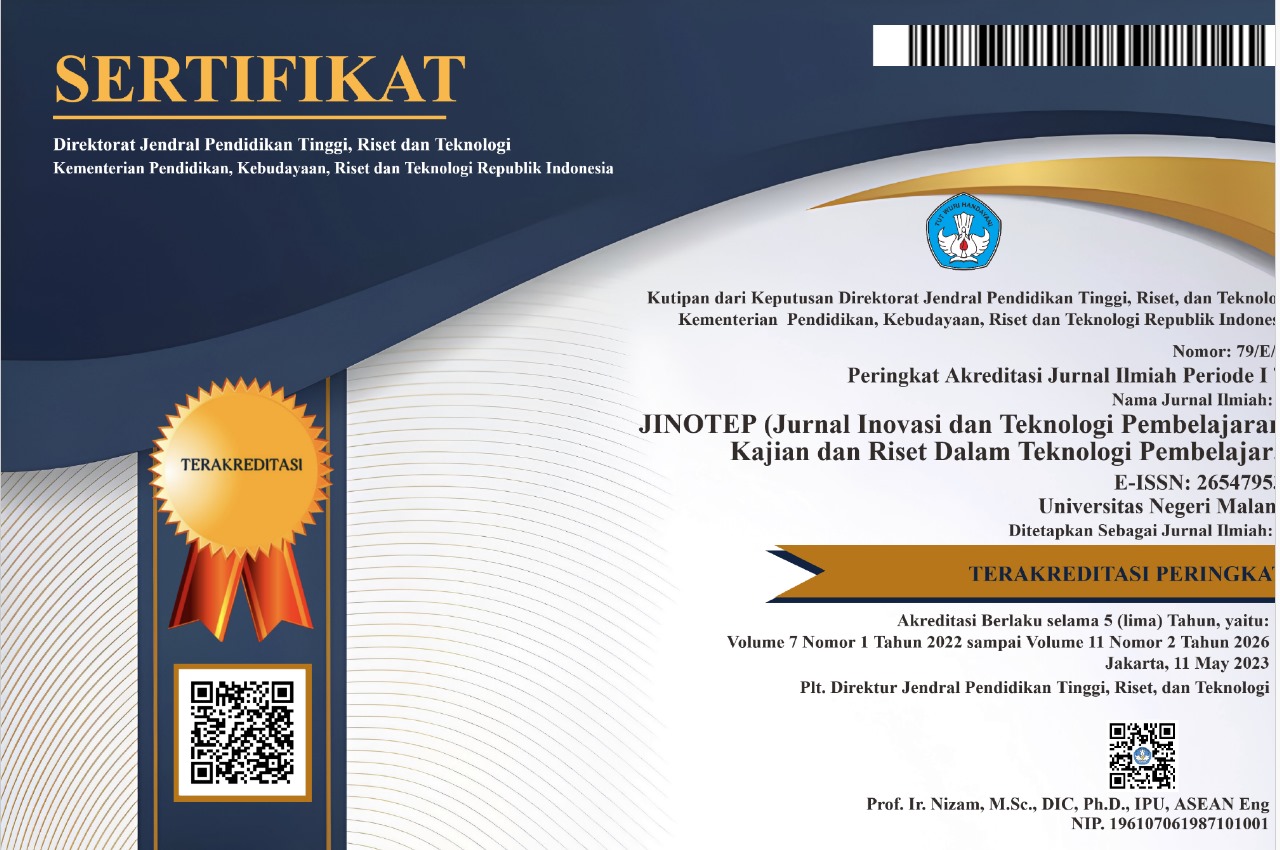Profil Pembelajaran Karakter Di Sekolah Dasar (Studi Kasus Pada Sekolah Dasar Di Kota Sampang)
Abstract
Abstract: The purpose of this study was to describe the implementation of character learning in the elementary school in Sampang to find out the lesson profile to be able to give a clear picture of the issues facing so that it can help to give the offer solutions. This study implemented a case study to describe and explain the terms related to the problem of learning the characters in elementary school by exploration on learning activities and learning-related characters, both conducted in the classroom and outside the classroom, where the focus is directed on the conditions of learning and learning strategies characters used in elementary school in Sampang. Its type is an intrinsic case study that is due to the desire of the researcher to understand certain cases in all aspects and specificity of its simplicity, led to the selection of the objects examined, rather than on methodological choice. The purposes of this study were to describe the character of learning profiles in elementary schools in Sampang, consists of: (1) the purpose of learning the characters, (2) the constraints faced in the implementation of learning the characters, (3) the characteristics of the students that there are elementary schools with regard to learning character, (4) learning content organizing strategy character, (5) the character of learning materials delivery strategies, and (6) the character of learning material management strategies. The findings showed character profile learning in primary schools in Sampang, that: (1) learning objectives listed in the "RPP character" administrative only because it has no relevance to the learning process and outcome, (2) generally refers to the creation of the learning objectives 18 characters set curriculum development center, (3) the obstacles faced are personnel and financial constraints (4) in general, there are two characteristics of the students, the quality identified on the basis of socio-economic backgrounds of learners and the community, (5) there is no material learning character so there was no strategi organizing of content (6) delivery of content strategy used was lecture, giving examples of direct and conditioning, (7) use the learning management strategies learning by doing, in which the method of giving examples of dominating at every learning activity, in addition to lecturing and giving the task.
Keywords
Full Text:
PDFReferences
Arends, Ricard I. 2007. Learning to Teach. Belajar untuk Mengajar Edisi Ketujuh. Terjemahan oleh Helly Prajitno Soetjipto dan
Sri Mulyani Soetjipto. 2008.Yogyakarta: Pustaka Pelajar.
Benson, P. L. 1997. All Kids are Our Kids: What communities must do to raise caring and responsible children and adolescent. San Fransisco: Jossey-Bass.
Bloom, B.S. 1976. Human Characteristics and School Learning. New York: Mc. Graw-Hill.
Borg, Walter R. & Gall, Meredith D. 1983. Educational Research. Fourth Edition. New York. Longman Inc.
Brugman, D., Podildkij, A.J., Heymans, P.G., Boom, J., Karabanova, O., & Idobaeva, O., 2003. Perception of Moral Atmosphere in School and Norm Transgressive Behavior in Adolesencts: In Intervention Study. International Journal Behavioral Development, (27): 289-300.
Degeng, Nyoman S. 2013. Ilmu Pembelajaran Klasifikasi Variabel untuk Pengembangan Teori dan Penelitian. Bandung: Kalam Hidup.
Degeng, Nyoman S. 1989. Ilmu Pengajaran Taksonomi Variabel. Jakarta : Direktorat Jenderal Pendidikan Tinggi, Depdikbud.
Degeng, Nyoman S. 1998. Mencari Paradigma Baru Pemecahan Masalah Belajar dari Keteraturan Menuju ke Kesemrawutan. Pidato Pengukuhan Guru Besar IKIP Malang. Malang: IKIP Malang
Fallona, C., & Richardson, V. 2006. Classroom Management as A Moral Activity. Dalam C. Everston & C. Weistein (Eds.) Handbook of Classroom Management (hlm. 1041-1062). Mahwah, NJ: Elbaum.
Gall, Meredith D. & Borg, Walter R. 2003. Educational Research An Introduction. Seventh Edition. Boston: Pearson Education, Inc.
Giroux, H., & Purpel, D. 1983. The Hidden Curriculum and Moral Education. Berkeley. CA: McCuchan.
Higgin-D’Alessandro, A., & Power, F.C. 2005. Character, Responsibility and The Moral Self. dalam D. K. Lapsley & F.C. Power (Eds.) Character Psychology and Character Education (hlm.101-102) Notre Dame. IN: University of Notre Dame Press.
Huberman, A. Michael & Miles Mattew B. 1984. Qualitatif Data Analisysis. Second Edition. California: Sage Pulication. Inc.
Huberman, A. Michael & Miles Mattew B. Tanpa Tahun. Manajemen Data dan Metode Analisis. Dalam Denzin,
Norman K.& Lincoln, Yvonna S. (Eds). 1997. Handbook of Qualitative Research. Terjemahan oleh Dariyanto, dkk. 2009. Yogyakarta: Pustaka Pelajar.
Kemp, J.E. dan Dayton, D.K. 1985. Planning and Producing Instructional Media. (Fifth Edition). New York: Harper & Row Publishers.
Kohn, A. 1992. No Contest: The Case Againt Competititon. Boston: Houngton Mifflin.
Lickona, T., Schaps, E., & Lewis C. 2007. Eleven Principle of Effective Character Education. Cortland, NY: Center.
Narvaes, D., Bock, T., Endicott, L., & Lies, J. 2004. Minnesota’s Community Voices and Character Education Project. Journal of Research in Character Education, (2): 89-112.
Nodding, N. 1989. Women and Evil. Berkeley: University of California Press.
Nodding, N. 2003. Happines and Education. Cambridge: Cambridge University Press.
Nodding, N. 2000a. Education Moral People: A Caring Alternative to Character Education. New York: Teacher College Press.
Nucci, L. 2001. Education in The Moral Domain. Cambridge, UK: Cambridge University Press.
Nucci, L & Narvaez, D. 2008. Handbook of Moral and Character Education. NewYork: Routladge.
Piaget & Inhelder. 1969. Psikologi Anak: The Psicology of The Child. Terjemahan oleh Miftahul Jannah. 2010. Yogyakarta: Pustaka Pelajar.
Pope, D.C. 2001. “Doing school”: How We Are Creating A Generation of Stressed Out, Materialistic, and Miseducated Student. New Haven, CT: Yale University Press.
Power, F.C. Higgins, A., & Kohlberg, L. 1989. Lawrence Kohlberg’s Approch to Moral Education. New York: Colombia University Press.
Ryan, K. 1986. In Defense of Character Education. Dalam L. Nucci (Ed.) Moral Development and Character Education: A Dialogue (hlm. 2-17).
Berkeley, CA.: Mccutchan. Santrock, J. W. 2004. Educational Psychology, 2nd Editon. New York: McGraw-Hill Company.
Semiawan, Conny. 2000. Relevansi Kurikulum Pendidikan Masa Depan. Dalam Sindunata (Ed). Membuka Masa Depan AnakAnak Kita Mencari Kurikulum Pendidikan Abat XXI ( hlm. 33-47) Yogyakarta: Kanisius.
Slavin, Robert E. 2006. Psikologi Pendidikan Teori dan Praktik. Edisi Kedelapan. Jilid 1. Terjemahan oleh Marianto Samosir. 2009. Jakarta: PT. Indeks.
Slavin, Robert E. 2006. Psikologi Pendidikan Teori dan Praktik. Edisi Kedelapan. Jilid 2. Terjemahan oleh Marianto Samosir. 2009. Jakarta: PT. Indeks.
Smetana, J. G. 2006. Social-Cognitive Domain Theory: Consistencies and Variations in Children’s Moral and Social Judgement. Dalam M. Killen & J. Smetana (Eds.) Handbook of Moral Development (hlm. 119-154) Majwah, NJ: Erlbaum.
Stake, Robert E. Tanpa Tahun. Studi Kasus. Dalam Denzin, Norman K. dan Lincoln, Yvonna S. (Eds.) Hand Book Of Qualitative Research (hlm. 299-315). Terjemahan oleh Dariyanto, Badrus Samsul Fata dan John Rinaldi. Yogyakarta: Pustaka Pelajar.
Stengel, B.S. & Tom, A. R. 2006. Moral Matters: Five Ways to Develop The Moral Life in Schools. New York: Teacher College Press.
Woolfolk, A. 2008. Educational Psychology Active Learning Edition. Edisi Kesepuluh. Jilid 1. Terjemahan oleh Helly Prajitno
Soetjipto dan Srimulyani Soetjipto. 2009. Yogyakarta: Pustaka Pelajar. Woolfolk, A. 2008. Educational Psychology Active Learning Edition. Edisi Kesepuluh. Jilid 2. Terjemahan oleh Helly Prajitno
Soetjipto dan Srimulyani Soetjipto. 2009. Yogyakarta: Pustaka Pelajar.
Youniss, J., & Yates, M. 1997. Community Service and Social Responsibility. Chicago: University of Chicago Press.
Youniss, J., & Yates, M. 1999. Youth Service and Moral-Civic Identity: A Case for Everyday Morality. Educational Psychology Review, (11): 361-367.
DOI: http://dx.doi.org/10.17977/um031v3i12016p031
Refbacks
- There are currently no refbacks.
Copyright (c) 2016 Amir Hamzah

This work is licensed under a Creative Commons Attribution-ShareAlike 4.0 International License.
======================================================================
Jurnal Inovasi dan Teknologi Pembelajaran published by Universitas Negeri Malang in collaboration with the Asosiasi Program Studi Teknologi Pendidikan Indonesia (APS TPI) and Ikatan Profesi Teknologi Pendidikan Indonesia (IPTPI) with a MoU.
Publisher Address:
Educational Technology Laboratorium, Building D5, 1st Floor
Faculty of Education, Universitas Negeri Malang
Semarang St. No. 5, Malang City, East Java Province, Postal Code 65145
Email: jinotep.fip@um.ac.id
======================================================================

JINOTEP is licensed under a Creative Commons Attribution-ShareAlike 4.0 International License.
JINOTEP Statistics (Since July 13th, 2020)


.png)




.png)
1.png)
1.png)
4.png)
2.png)
1.png)
1.png)
.png)


_3.png)





1.png)
.png)